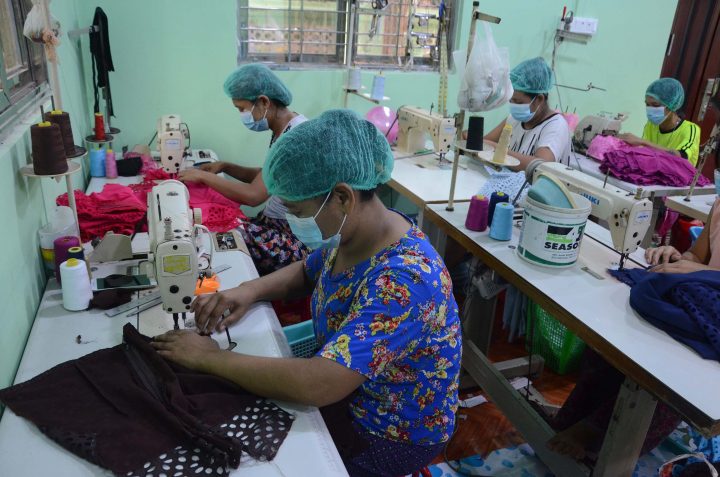1 Sep
The CMP garment sector in Myanmar has been hit hard by the coronavirus impacts amid the global demand slump, said an official of Myanmar Garment Manufacturers Association.
Supply chain disruptions and cancelling customer orders following the coronavirus outbreak hurt the global textile industry. Similarly, the CMP garment sector which contributes to 30 per cent of Myanmar’s export sector is bracing for downward trend owing to the cancellation of the order from European countries and suspension of the trade by western countries amid the pandemic.
Exports of garments manufactured under the cut-make-pack (CMP) system were valued about US$4 billion around the past eleven months in the current financial year 2019-2020, said an official of the Ministry of Commerce.
Myanmar manufacturing sector primarily concentrates in CMP garments and textiles, which contribute to the country’s GDP to some extent.
The garment sector is among the prioritized sectors driving up exports. The CMP garment industry has emerged as a promising one, with preferential trade from Western countries.
The majority of Myanmar’s garment factories operate under the CMP system, and those engaged in this industry are striving to transform CMP into the free-on-board (FoB) system, according to the Myanmar Garment Manufacturers Association.
At present, some CMP garment factories have shut down on the reason for the lack of raw materials due to the coronavirus negative impacts, leaving thousands of workers unemployed.
The coronavirus impacts badly batter the labour-intensive enterprises, said an official of the Directorate of Investment and Company Administration.
However, foreign direct investments flow into many types of businesses, including garment enterprises. The foreign investors are not bothered by the disputes between employers and employees and the closure of some CMP businesses during the mean times as Myanmar has EU’s preferential trade. Of the investment proposals, the manufacturing and labour-intensive businesses are prioritized by the commission.
Myanmar Investment Commission is planning to accept investment projects in manufacturing masks, pharmaceuticals and others which can contribute to the fight against the coronavirus in the country at the soonest.
The export value of CMP garments was only $850 million in the 2015-2016 budget year, but it has tripled over the last two FYs. In the 2016-2017FY, about $2 billion was earned from exports of CMP garments. The figure increased to an estimated $2.5 billion in the 2017-2018FY and $2.2 billion in the 2018 mini-budget period (from April to September). It tremendously grew to $4.6 billion in the 2018-2019FY, according to the Commerce Ministry.
Myanmar mainly exports CMP garments to markets in Japan and Europe, along with the Republic of Korea, China, and the US. With demand from foreign trade partners growing, imports of CMP raw materials are rising year by year. Since an outbreak like COVID-19 might happen in the future, it is necessary to prepare for a sufficient supply of raw materials. The public and private sectors will cooperate in setting up the supply chain on our sources, including weaving, knitting, dyeing, and sewing factories.
The MGMA has more than 700 members, and garment factories in Myanmar, employing more than 500,000 workers. Investors prefer to invest in countries with inexpensive labour, such as Myanmar.
Ko Htet (Translated by Ei Myat Mon)


